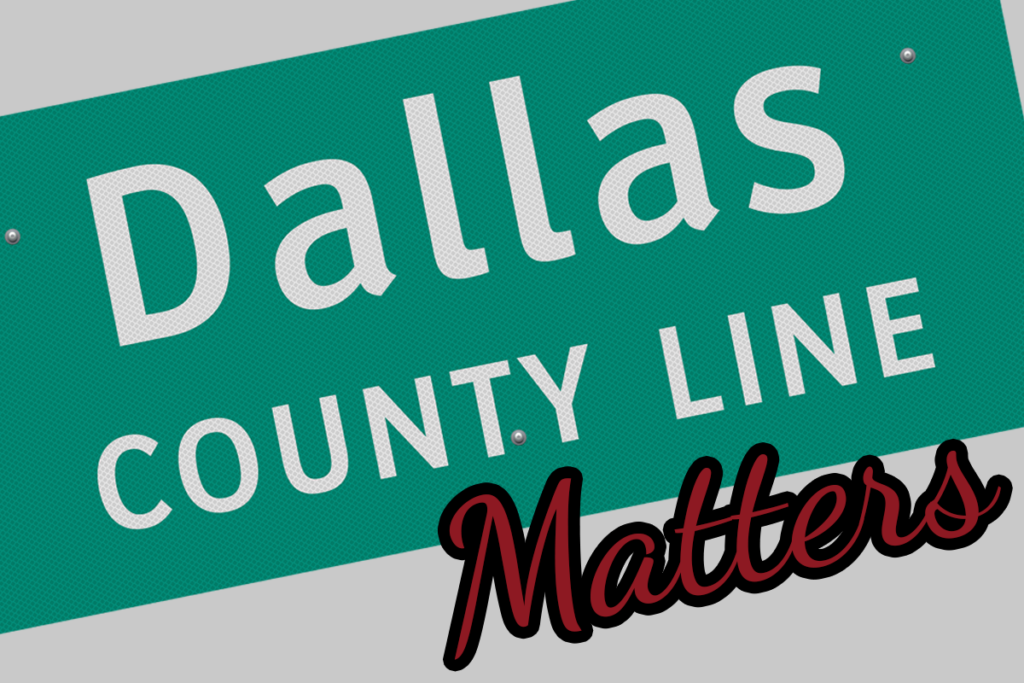One of the finer points of practicing patent litigation in Texas, which is home to four federal judicial districts, is knowing whether a defendant in the DFW area is located north or south of the Dallas County line. The boundaries between the Eastern, Western, Northern, and Southern Districts of Texas are based on county lines. For example, parts of the city of Carrollton north of the city of Dallas are located in three counties: Dallas, Denton, and Collin.
Finding the line
An easy way to see the county lines and map them to the defendant’s address is to use a feature in Google Earth. If you search for “Dallas County, Tx,” Google Earth will draw a red line around the county boundary on the map. (Note: if you have not updated your Chrome browser lately, like me, Google Earth may not download.)
Whether you are a plaintiff or defendant, those county lines determine where the jury pool will be selected. Venues like Marshall and Tyler in the Eastern District of Texas are more rural, and jurors may include oilfield workers, ranchers, metal workers, various trade skills in light industries, as well as active and retired municipal employees including teachers, police officers, and firemen, as well as preachers of various denominations, among others. In one instance, a Ph.D. A chemist from LeTourneau University in Longview was on my panel in Marshall. In contrast, juror pools in Plano and Sherman tend to have a heavier concentration of information technology professionals. (Another fine point of practice in the E.D. of Texas is that the Plano courthouse is an “annex” to the Sherman courthouse in the “Sherman Division,” and it is only possible to file a complaint in the Sherman Division, which is then randomly assigned between the Sherman courthouse and the annex in Plano.)
Venue in patent litigation
The United States Court of Appeals for the Federal Circuit in In re: BigCommerce, Inc. considered how the fact that Texas has four federal judicial districts plays into the TC Heartland framework for venue for patent infringement cases. The plaintiffs in two separate cases had filed suit in the Eastern District of Texas against BigCommerce, Inc., a corporation organized under the laws of Texas, with a principal place of business in Austin, Texas (located in the Western District of Texas). The parties did not dispute that BigCommerce had no regular and established place of business in the Eastern District of Texas.
Under the U.S. Supreme Court opinion in TC Heartland, a patent infringement plaintiff has two choices for venue as to a U.S. domestic corporate defendant under the patent venue statute at 28 U.S.C. 1400(b): (1) the district in which the defendant is incorporated; or (2) the district in which the defendant has a “regular and established place of business” AND in which acts of infringement by the defendant have occurred. Here, the second choice was not applicable, and the plaintiffs’ theory was that because BigCommerce was incorporated in Texas, any of the four judicial districts would do. The Federal Circuit disagreed as follows:
“We first address the question of whether a domestic corporation incorporated in a state having multiple judicial districts “resides” for purposes of the patent-specific venue statute, § 1400(b), in each and every judicial district in that state. We hold that it does not. That conclusion finds clear support in the statute’s language, history, purpose, and precedent.”
The court then clarified the definition of “resides” in a state with multiple judicial districts applies only to that district where “the principal place of business is located” which generally involves the location of where its books are kept and its corporate business is transacted.
Theodore G. Baroody is a partner at Carstens, Allen & Gourley, LLP. His practice of intellectual property litigation focuses on patent litigation as well as other IP disputes including trade secret, copyright, trademark and Lanham Act litigation.
Download The Dallas County Line Matters


